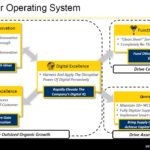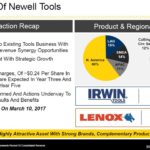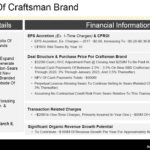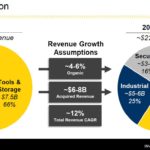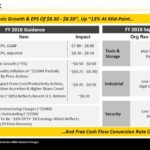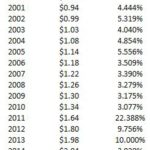Contents
![]()
Summary
- Stanley Black & Decker has grown dramatically in recent years through a strategy of organic growth and acquisition.
- It possesses a portfolio of well known brands and its two most significant recent acquisitions are Newell Brands and Craftsman.
- It is one of a handful of companies which has increased its dividend uninterrupted annually for at least 50 years putting it in the elite Dividend King group of companies.
- A drawback with Stanley Black & Decker’s prolific acquisition strategy is that it has taken on a considerable amount of Goodwill (represents ~64% of Total Assets).
- Despite the recent ~$10 retracement in the stock price over the past 2 weeks I still view the shares as being overpriced and will patiently wait before initiating a position.
Introduction
Stanley Black & Decker (NYSE: SWK) reported Q4 and FY2017 results on January 24, 2018. In addition, it was announced on the same day that SWK would be acquiring Nelson Fastener Systems from the Doncasters Group for $0.44B. This deal is expected to close later in Q1 2018.
Business Overview
SWK was founded in 1843 and was incorporated in 1852. In March 2010 it merged with The Black and Decker Corporation which was founded and incorporated in 1910. As evidence by the following, long-term SWK shareholders ahve been richly rewarded.
Source: SWK October 27, 2017 Investor Presentation
It is a diversified global provider of hand tools, power tools and related accessories, mechanical access solutions (i.e. automatic doors and commercial locking systems), electronic security and monitoring systems, healthcare solutions, engineered fastening systems and products and services for various industrial applications.
Source: SWK October 27, 2017 Investor Presentation
The company is focused on organic growth, including increasing its presence in emerging markets. Its goal is to generate more than 20% of annual revenues from those markets over time through the leveraging of the Stanley Fulfillment System ("SFS 2.0") which focuses on upgrading innovation and digital capabilities while maintaining commercial and supply chain excellence.
Source: SWK October 27, 2017 Investor Presentation
SWK also continues to pursue a growth and acquisition strategy that involves industry, geographic and customer diversification for the purposes of generating sustainable revenue, earnings and cash flow growth.
Execution of SWK’s strategy has resulted in ~$6.5B of acquisitions since 2002 (excludes the Black & Decker merger and acquisitions of the Tools business of Newell Brands ("Newell Tools") and the Craftsman® brand.
Source: SWK October 27, 2017 Investor Presentation
SWK is currently executing plans to integrate Newell Tools’ employees, suppliers and customers into SWK’s operations. Management is confident is will be able to capture ~$0.08B - ~$0.09B of cost synergies.
In late 2016, SWK acquired the industrial cutting, hand tool and power tool accessory brands Irwin® and Lenox®, for $1.95B in cash. That acquisition significantly increased SWK’s presence in the power tool accessories business and expanded SWK’s footprint in the plumbing and electrical channels.
In 2017, SWK purchased the Craftsman brand from Sears Holdings. Terms of that agreement were a $0.525B cash payment to Sears and a $0.25B payment at the end of year three of their relationship. SWK will also send annual payments to Sears of between 2.5 - 3.5% on new SWK sales of Craftsman products through year 15.
Source: SWK October 27, 2017 Investor Presentation
At the time the acquisition was announced in January 2017, SWK indicated that only ~10% of Craftsman-branded products are sold outside of Sears Holdings. The agreement will enable SWK to significantly increase Craftsman sales in these untapped channels.
Craftsman tools were previously sold at Ace Hardware, Orchard Supply Hardware, Blain's Farm and Fleet, Atwoods Ranch and Home, and Sears and Kmart. In October 2017, SWK announced that starting in the second half of 2018, a broad assortment of Craftsman products will be available both in Lowe's stores and online. SWK will also work with Lowe's to manufacture and develop other products for the home improvement retailer.
22/22 Vision
SWK’s vision is to become a diversified industrial company generating ~$22B in revenue by 2022. The company plans to generate 4% - 6% annual organic revenue growth plus another $5B - $9B of revenue from acquisitions across its various business segments by 2022.
Source: SWK October 27, 2017 Investor Presentation
In order to reach its aggressive performance goals, SWK is focused on three key strategic themes:
- become Recognized as one of the World’s Most Innovative Companies;
- continue to Deliver Top-Quartile Performance;
- Elevate Commitment to Corporate Social Responsibility.
SWK’s well-established value creation model is designed to produce exceptional shareholder value. It starts with SWK’s world-class brands, attractive growth platforms, and scalable and defensible franchises and leverages SWK’s SFS 2.0 operating system to generate outsized organic growth, operating margin rate expansion, and strong free cash flow conversion.
SWK’s also employs an investor-friendly capital allocation model. The approach is to return ~50% of its capital to shareholders in the form of dividends and/or opportunistic share repurchases. The remaining ~50% is earmarked for acquisitions to further strengthen the business portfolio and to fuel growth.
Q4 and FY2017 Financial Results
SWK’s Q4 and FY2017 results can be found here.
In fiscal 2017, SWK generated ~70% of its ~$13B in revenue from its Tools and Storage segment, and 15% each from its Industrial and Security segments. SWK generated 73%, 17%, and 10% of its FY2017 profitability (excluding Corporate Overhead) from its Tools and Storage, Industrial, and Security segments.
Source: SWK - Q4 and FY 2017 Earnings Presentation
While SWK is focused on organic growth it also pursues growth through acquisition. This has resulted in annual revenue increasing from $2.187B in fiscal 2002 to $12.747B in fiscal 2017. Growth by acquisition typically results in a Goodwill component with Goodwill representing the cost in excess of fair values assigned to the underlying net assets of acquired businesses.
As a result of SWK’s many acquisitions over the years, Goodwill on its balance sheet ($12.286B) is now at 64% of Total Assets; SWK’s Goodwill as at the end of fiscal 2014 - 2016 only represented 46.7%, 46%, and 57.5% of Total Assets. Given SWK’s vision to generate $22B in revenue by 2022, I suspect several more acquisitions will be made in the next few years. This will likely result in an increase in the level of Goodwill relative to Total Assets.
Forecast
The 2018 adjusted earnings per share (EPS) forecast reflected below was provided January 24, 2018.
SWK is targeting ~5% organic growth in 2018. This is expected to result in the adjusted EPS reflected below.
The ~100% FCF conversion rate means that FCF will be almost equivalent to the projected $8.30 - $8.50 in adjusted net earnings.
Source: SWK - Q4 and FY 2017 Earnings Presentation
Readers should be aware that SWK is adopting two new accounting standards with respect to revenue recognition and pension accounting. These changes have a modest negative impact on SWK’s operating margin rates and are relatively neutral to EPS.
As noted at the beginning of this article, SWK reached an agreement in late December 2017 to purchase the industrial-focused business of Nelson Fastener Systems for $0.44B from Doncasters Group; the transaction is expected to close in the first half of 2018. Management has indicated that Nelson Fastener Systems will expand SWK’s portfolio of highly engineered fastening solutions and will deliver significant cost synergies relative to its size.
Revenue over the last 12 months amounted to ~$0.2B and Nelson employs about 700 people in 11 manufacturing sites. This is an ideal bolt-on acquisition for SWK’s Engineered Fastening business within the Industrial segment.
SWK expects the decrease in the US tax rate from 35% to 21% will reduce its effective tax rate by ~5%. This benefit, however, is mitigated by ~3% of tax costs on certain new provisions in the tax law as well as reduced benefits from previously allowed deductions. As a result, the overall estimated impact from the new legislation is a ~2% benefit to SWK’s 2018 effective tax rate.
Long-Term Credit Rating
Moody’s rates SWK’s Senior Unsecured Debt as Baa1 (stable). This is a lower medium grade credit rating.
Standard & Poor’s currently rates the same debt as A (stable). This is an upper medium grade credit rating.
Valuation
SWK reported adjusted diluted EPS of $7.45 for fiscal 2017 and has projected adjusted diluted EPS of $8.30 - $8.50 for fiscal 2018.
Based on the January 30, 2018 closing stock price of $166.36, we get a forward adjusted PE of ~19.57 - ~20.04.
I view this level as somewhat elevated although it certainly is an improvement from the valuation level of two weeks ago when SWK’s stock price reached ~$176.
SWK is in an elite group of companies which has increased its dividend annually for 50 or more years. Historical details can be found here.
Annual dividend increases have been relatively modest with the exception of 2011 – 2013 which has skewed upward the average compound annual growth rate for the 2000 – 2017 period.
The current $0.63/quarter ($2.52/year) dividend was increased in Q3 2017. Based on the January 30, 2018 $166.36 closing stock price, SWK has a ~1.5% dividend yield.
The outlook for 2018’s adjusted EPS is $8.30 - $8.50/share. On this basis, SWK’s dividend payout ratio will be in the ~29.6% - ~30.4% range. I view this as a reasonable payout level.
SWK’s approach is to return ~50% of its capital to shareholders in the form of dividends and/or opportunistic share repurchases. In fiscal 2012, 166.7 million shares were outstanding. This has subsequently been reduced to 152.45 million shares outstanding as at the end of FY2017. The repurchase of additional shares in fiscal 2018 will be dependent on management’s view as to the valuation of SWK’s shares.
Final Thoughts
If there is one major drawback to SWK, it is that its growth through acquisition is resulting in a rapid increase in the level of Goodwill. Fortunately, SWK has been fairly astute with its acquisitions and Goodwill impairment charges have not been an issue over the years.
I like SWK’s durable competitive advantages and would be prepared to acquire shares with the view of holding for the very long-term. I am hesitant, however, to acquire shares at the current level ($166.36) despite the recent pull back from $176 just 2 weeks ago.
I am in no hurry to acquire the shares and will patiently wait for SWK to retrace to the high $150's level or lower before initiating a position.
I wish you much success on your journey to financial freedom.
Thanks for reading!
Note: Thanks for reading this article. Please send any feedback, corrections, or questions to [email protected].
Disclaimer: I have no knowledge of your individual circumstances and am not providing individualized advice or recommendations. I encourage you not to make any investment decision without conducting your own research and due diligence. You should also consult your financial advisor about your specific situation.
Disclosure: I do not currently own shares in SWK and do not intend to purchase shares within the next 72 hours.
I wrote this article myself and it expresses my own opinions. I am not receiving compensation for it and have no business relationship with any company whose stock is mentioned in this article.





